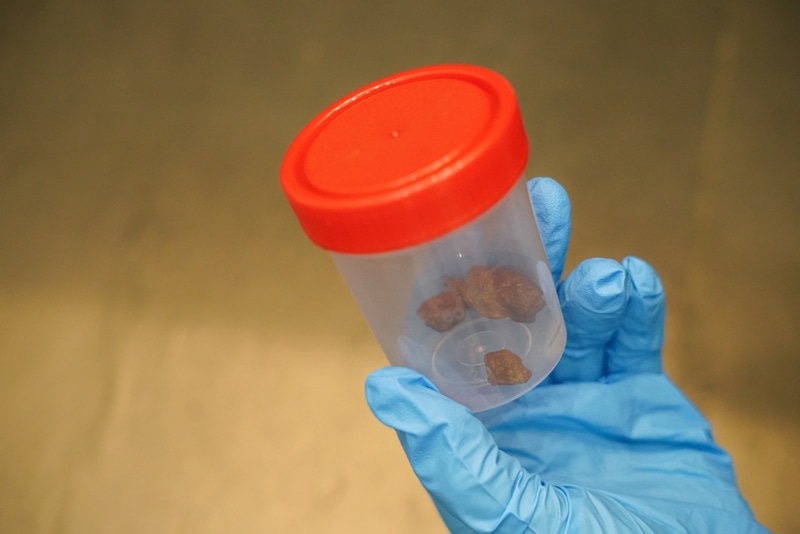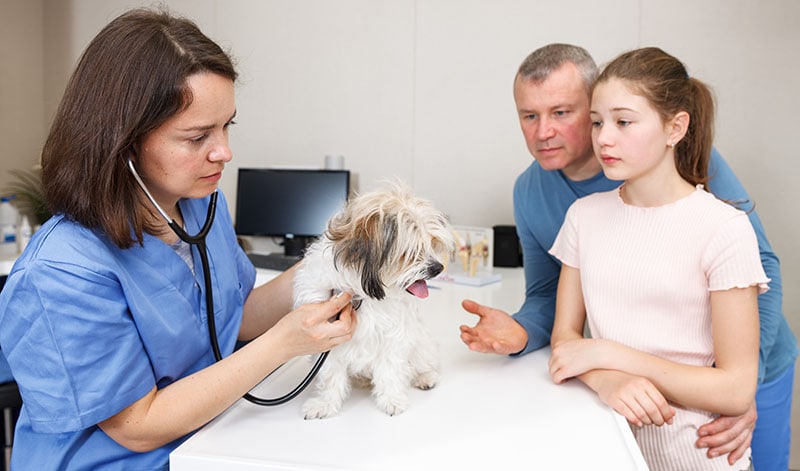Can Humans Get Worms from Dogs? Vet-Reviewed Facts & FAQ
By Hanh Duong
Updated on

Click to Skip Ahead
You might not consider the possibility of receiving some unwanted “visitors” when you cuddle and kiss your animal companion, but this is an unfortunate reality. Have you ever questioned whether humans could get worms from dogs? Well, unfortunately, you can.
The types of worms that can spread from pets to people,1 the illnesses they may cause, and the best ways to avoid this potential health risk are all covered in the article below.
What Worms Can Humans Get from Dogs?
Roundworms
If a dog has recently been out rolling around in the dirt and gathered contaminated feces or soil on their fur, it is theoretically possible to get roundworms from petting the dog.
Ingestion of roundworms can occasionally cause a condition known as “visceral larval migrans.” This occurs when the larvae of roundworms migrate through the intestinal wall into other internal organs, such as the eyes, heart, lungs, and nervous system. The condition is typically treatable and some people may experience mild headaches or fatigue, although several cases of retinal detachment and acute blindness in humans have been linked to roundworm larvae.

Hookworms
The skin condition known as “cutaneous larval migrans” can develop as a result of exposure to soil that has hookworm larvae. The eggs from the hookworm get into the environment through your dog’s feces. Because the live larvae are migrating through the tissue, these infections can be extremely itchy. They appear as red tracks or lesions just beneath the skin’s surface.
Although it’s uncommon, hookworm larvae can develop into adults in a human host and survive in the intestine. This can result in sporadic and ongoing episodes of cramping and abdominal pain.
Tapeworms
Similar to the way tapeworms are transmitted among dogs, humans can contract them by accidentally ingesting infected fleas. The tapeworm larva can attach to the intestine wall once the flea has been swallowed and absorbed in the digestive tract.

How Do Puppies Get Worms?
Roundworms and hookworms can affect dogs of any age, but young puppies are most vulnerable—puppies as young as 2–3 weeks old can have a lot of worms. The reason is that before the puppies are born, mothers frequently transmit these worms to their offspring. Sometimes they are transmitted through a mother’s milk after the puppies are born. Infected dogs can contaminate an area by passing larvae or worm eggs in their feces, which may then be ingested accidentally by other dogs.
How to Tell if Your Dog Has Worms
It can be difficult to ascertain whether your dog has worms, but watch out for any or all of the following changes in your dog’s appearance and general health. Some changes include:
- Vomiting, which can include adult worms.
- Diarrhea that has blood or mucus in it sometimes.
- A bloated stomach.
- Weight loss, especially if your pup is an avid eater.
- A coat that is dry and dull.
- Excessive bottom scooting and chewing.
- Visible segments that resemble rice grains are affixed to the fur on their tail, around their bottom, or in their feces.

What to Do If You Suspect Your Dog Has Worms
If you think your dog may have an intestinal parasite of any kind, here’s what to do.
Call Your Veterinary Clinic
Make a call to your trusted veterinary clinic as soon as possible if you suspect your dog may have worms. They will be able to advise you on the best course of action.
Take a Sample of Your Dog’s Stool
If you discover dry, rice-like pieces in your dog’s fur or find worms in their feces, your veterinarian may ask you to provide a fresh sample of your dog’s stool. Most often, collecting a teaspoon-size sample of their feces is enough. However, if you can’t get it at home, the veterinary team will do so when you show up for your dog’s visit. They will also examine the sample for distinct, tiny eggs if they suspect the presence of hookworms, roundworms, or whipworms.

How Can You Protect Yourself, Your Pets, and Your Family Against Worm Infections?
- Early on, take puppies to the vet to get them dewormed. Deworming these cute canines may require multiple treatments. So, you should follow your veterinarian’s guide for examinations and treatments. A common regimen is worming once monthly until 6 months of age and then 3 monthly thereafter.
- Start or continue a program for your pets that prevents, treats, and manages worms. Your veterinarian can recommend treatments to get rid of and aid in preventing diseases.
- After engaging in outdoor activities, interacting with dogs or other animals, and before handling or eating food, wash your hands with soap and water.
- Pet waste should not be left in gardens, lawns, or play areas near your house.
- Don’t touch any dirt, sand, plants, or anything else that may be contaminated by an infected animal.

Conclusion
Worms can exist in animals that seem to be in good health or can lead to pain, disease, and even death in severe cases. Regardless of whether you believe your furry friend has worms or not, regular deworming is crucial since some of the diseases they carry can also be passed on to humans. We deworm our pets to save them from suffering, but it also lessens the risk to us and our families. It is also encouraged that we regularly deworm ourselves and families.
See also:
Featured Image Credit: gemphoto, Shutterstock











